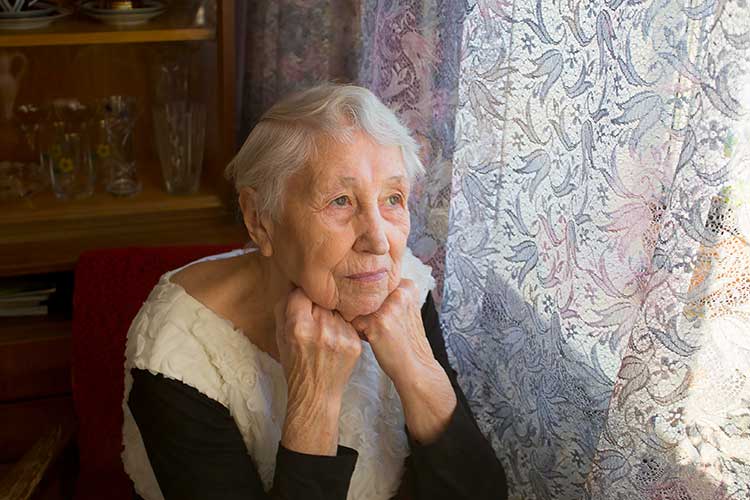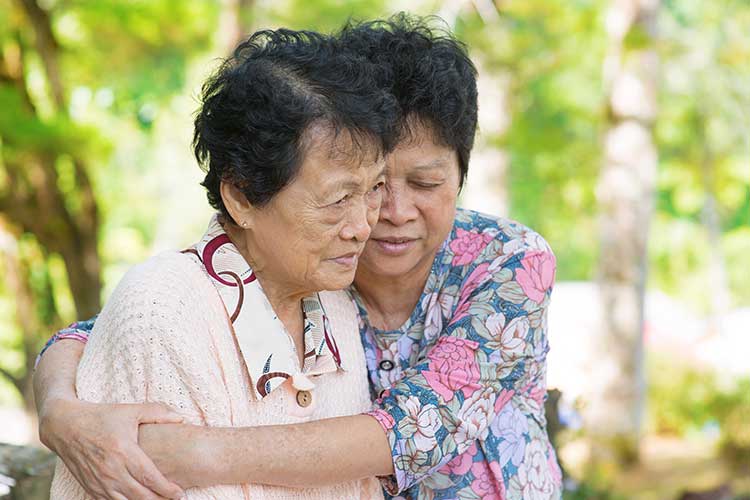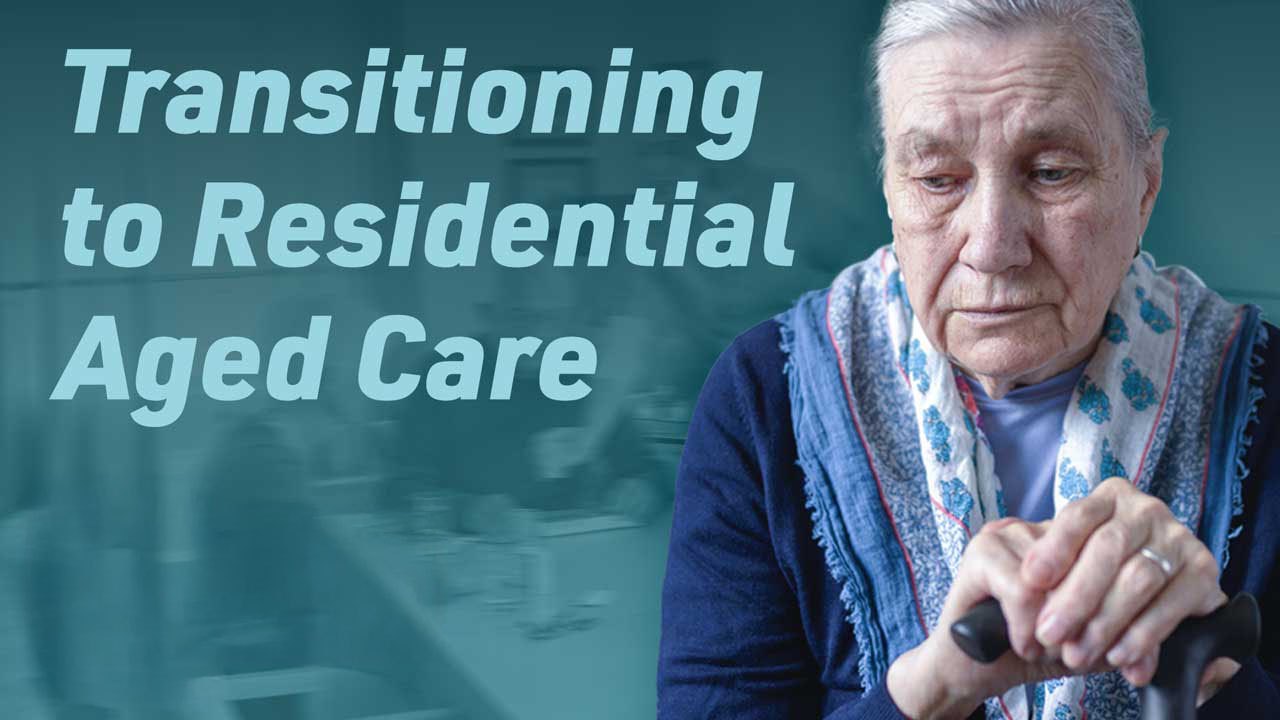What do you think of when you hear the words ‘loss’ and ‘grief’?
For many people, the first thought that comes to mind is probably death.
Despite this, there are, in reality, many types of loss, one of those being changes in circumstances (Queensland Government 2021), which may relate to changing jobs, retiring, moving away or other life events significant to the individual (Healthdirect 2022).
One such life event that has increasingly been found to cause feelings of grief is the transition from living at home to residential aged care (Zizzo et al. 2020). These feelings of grief may affect the older person, their loved ones, carers and possibly even staff (GriefLink 2021).
With that in mind, how can we better support older people and their families during these challenging times?
What are Loss and Grief?
Firstly, let’s define what exactly the terms loss and grief mean.
Grief is a natural emotional reaction to the loss of someone or something important. It’s an individual experience that affects every person differently and may be expressed in a variety of ways (Healthdirect 2022).
People experiencing grief may feel emotions such as:
- Sadness
- Shock
- Denial
- Numbness
- Anger
- Guilt
- Blame
- Relief.
(Healthdirect 2022)
Why Might Transitioning to Aged Care Cause Loss and Grief?

Transitioning into residential aged care is a major life event that can be difficult and stressful for an older person and their carers or loved ones, especially if the change has come about due to a medical issue and there is limited time to make a decision (Relationships Australia Victoria 2024).
It’s important to note that the adjustment to aged care doesn’t only occur during the move; it’s a gradual process that begins long before the physical transition and continues after the person enters the facility (BaptistCare 2014).
In some cases, it might even take 6 to 12 months for a person to fully adjust to their new environment (Relationships Australia Victoria 2024).
It’s estimated that over 50% of older people living in residential aged care experience depression and/or anxiety, compared to 10% of older people overall. Furthermore, less than half of that 50% enter residential aged care with pre-existing mental illness (DPS Media 2017).
Specific reasons why older people may experience grief when transitioning into aged care include:
- Reduction in physical health
- The transition to communal living
- Loss or dispersal of valued belongings
- Loss of independence, dignity and identity
- Loss of social connections
- Loss of valued routines
- Loss of the comfort and familiarity of their home
- Feelings of homelessness and helplessness
- Reduced decision-making ability
- Lack of privacy
- Having negative perceptions of aged care facilities
- Fear of being forgotten by loved ones
- Fear of not being heard
- Fear of the unknown
- Fear of being mistreated
- Fear of living with people who have dementia
- The realisation that this may be the place where they die
- Fear and anxiety about the future and death
- Self-reflection or guilt about the quality of the life they have lived in the past
- Doubts about whether they have made the right choice
- Rushed admission into aged care due to a short decision-making period
- Language barriers between staff and residents.
(Aged Care Awareness n.d.; Meaningful Ageing Australia 2016; Relationships Australia Victoria 2024; GriefLink 2021; HelloCare 2017)
Family members or carers may also experience grief during this transition for a variety of reasons, including:
- Feelings of guilt for placing their loved one into residential aged care and ‘abandoning’ them
- Feelings of sadness and frustration that they are no longer able to take care of their loved one
- Feelings of shame that they have ‘failed at their responsibilities’
- Feelings of resentment from other family members who do not agree with the decision to place their loved one into aged care, which may lead to arguments and impaired relationships
- Feelings of disconnect and loneliness when their loved one is no longer in their full-time care
- Loss of their caring routine
- Anxiety about handing over responsibility to aged care staff
- Loss of their primary care role (particularly for spouses)
- Fear that their loved one will not receive compassionate and high-quality care
- Watching their loved one experience distress when transitioning
- Loss of an imagined future
- Loss of their relationship with their loved one as it used to be
- Loss of companionship
- Loss of their loved one’s former self (in the case of people with dementia)
- Having conversations about end-of-life and death.
(GriefLink 2021)

Who is at Increased Risk of Experiencing Grief When Transitioning to Aged Care?
Some older people have additional needs that may make adjusting to residential aged care harder. These people include:
- Aboriginal and Torres Strait Islander people
- Those from culturally and linguistically diverse backgrounds
- Those living in rural or remote areas
- Those who are financially or socially disadvantaged
- Veterans
- Spouses or widows of veterans
- Those who are homeless or at risk of becoming homeless
- Care leavers
- Members of the LGBT community
- Those living with dementia
- Those nearing the end of their life
- Those receiving palliative care
- Those living with mental illness.
(Meaningful Ageing Australia 2016)
Loss and Grief Under the Strengthened Aged Care Quality Standards
Standard 5: Clinical Care - Outcome 5.5: Clinical Safety under the strengthened Aged Care Quality Standards (Action 5.5.6) requires aged care providers to optimise older people’s mental health by:
- Promoting mental health and wellbeing
- Recognising and addressing signs of deterioration in mental health
- Providing support to older people who are experiencing distress or symptoms of mental illness (e.g. self-harm and suicidal thoughts) in order to reduce risks to their physical and psychological health.
(ACQSC 2024)
Recognising the Symptoms of Grief
The symptoms of grief may be similar to those of depression (Healthdirect 2022). A person who is experiencing grief may display signs such as:
- Changed behaviours
- Refusal of care
- Refusal to engage with other residents
- Feelings of agitation, anger or sadness
- Making unwarranted accusations against staff
- Pleading to ‘go home’
- Changes to eating and sleeping patterns
- Headaches
- Nausea
- Fatigue
- Exacerbation of existing conditions.
(Meaningful Ageing Australia 2016; BaptistCare 2014; GriefLink 2021)
Supporting Older People Who Are Transitioning to Aged Care

The following practical tips may help to support older people who are experiencing grief associated with entering residential aged care:
- Introduce yourself and your role to new resident - you might need to do this several times
- Get to know new residents - their likes, dislikes, favourite activities, history, behaviour etc.
- Encourage residents to participate in leisure and social activities
- Don’t take it personally if residents are resisting care
- Respect residents’ privacy - always knock and ask if you can enter their room
- Always treat residents with respect and dignity
- Give residents choice and autonomy, for example, giving them a choice of meals and allowing freedom of movement
- Consider using a buddy program to help new residents feel welcome and included
- Find out if your organisation can support residents to have important and familiar belongings in their room
- Address any negative perceptions of aged care held by residents
- Listen to and respect residents’ experiences, even if they are being ‘negative’
- Acknowledge that change is difficult for residents and ask how you can help make it easier for them
- Ask residents about their familial relationships and find out if their families have been supporting them during the transition
- Be mindful of residents who do not have a strong support network
- Be a friendly face that residents feel comfortable confiding in
- Ask residents what’s on their minds and find out if they would like to share their worries with an outside party
- Ask residents about their memories and loved ones
- Be mindful of burnout and compassion fatigue. If you are feeling overwhelmed or distressed, seek help. One good resource is Nurse & Midwife Support, which can be contacted at 1800 667 877.
(Meaningful Ageing Australia 2016; Aged Care Awareness n.d.; BaptistCare 2014)
Test Your Knowledge
Question 1 of 3
What practical tip is suggested to support an older person transitioning to aged care?
Topics
References
- Aged Care Awareness n.d., Transitioning Into Residential Aged Care, Aged Care Awareness, viewed 26 June 2024, http://agedcareawareness.com.au/6-months-later-feedback/
- Aged Care Quality and Safety Commission 2024, Standard 5: Clinical Care, Australian Government, viewed 19 June 2024, https://www.health.gov.au/resources/publications/strengthened-aged-care-quality-standards-august-2025?language=en
- BaptistCare 2014, A Moving Guide for People With Dementia, BaptistCare, viewed 26 June 2024, https://www.myagedcare.gov.au/sites/default/files/attachments/1-BQXOTZ_0.pdf
- Beyond Blue 2014, Grief and Loss, Beyond Blue, viewed 22 April 2021, https://www.beyondblue.org.au/the-facts/grief-and-loss
- DPS Media 2017, ‘Aged Care Residents More Likely to Experience Mental Health Issues’, Aged Care Guide, 3 May, viewed 26 June 2024, https://www.agedcareguide.com.au/talking-aged-care/people-in-aged-care-facilities-are-five-times-more-likely-to-be-depressed-says-beyondblue
- GriefLink 2021, Grief and Loss in Residential Aged Care, GriefLink, viewed 26 June 2024, https://grieflink.org.au/factsheets/grief-and-loss-in-residential-aged-care/
- Healthdirect 2022, Grief and Loss, Australian Government, viewed 26 June 2024, https://www.healthdirect.gov.au/grief-loss
- HelloCare 2017, ‘The Fear of Moving into Aged Care’, HelloCare, 17 October, viewed 26 June 2024, https://hellocare.com.au/fear-moving-aged-care/
- Meaningful Ageing Australia 2016, Transitioning to Residential Aged Care, Meaningful Ageing Australia, viewed 23 April 2021, https://meaningfulageing.org.au/product/transition-into-residential-aged-care/
- Queensland Government 2021, Grief Counselling and Support, Queensland Government, viewed 26 June 2024, https://www.qld.gov.au/health/support/loss/coping
- Relationships Australia Victoria 2024, Moving into Residential Aged Care, Relationships Australia Victoria, viewed 26 June 2024, https://www.relationshipsvictoria.org.au/media/jwujcwcu/moving-to-residential-aged-care-tip-sheet-24029.pdf
- Zizzo, G, Mackenzie, C, Irizarry, C & Goodwin-Smith, I 2020, ‘Loss and Grief: The Experience of Transition to Residential Aged Care’, Australian Journal of Social Issues, vol. 55, no. 4, viewed 26 June 2024, https://onlinelibrary.wiley.com/doi/10.1002/ajs4.105
 New
New 
